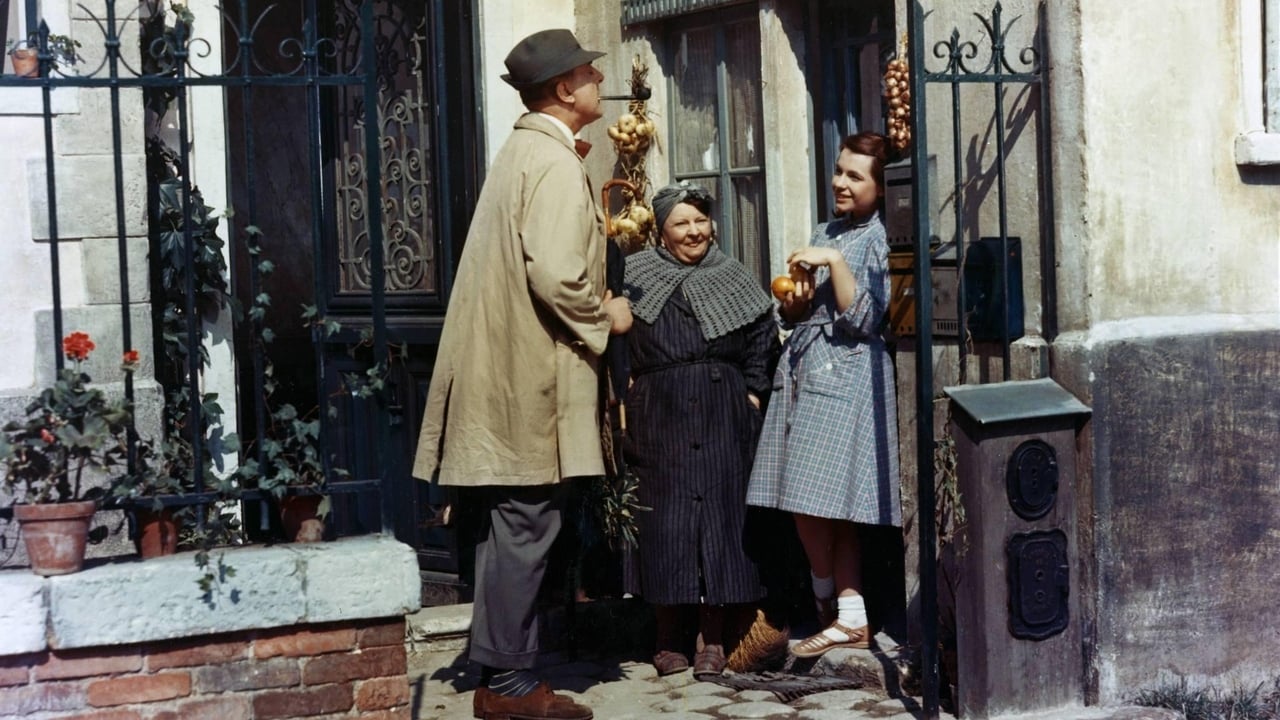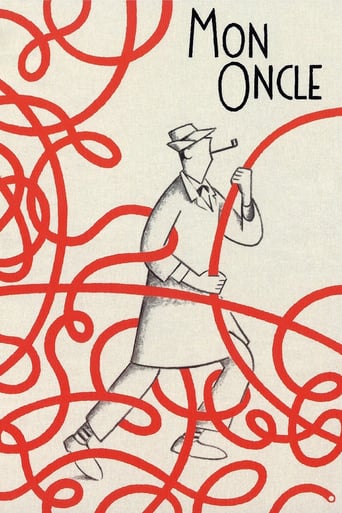

Really Surprised!
... View MoreGood concept, poorly executed.
... View MoreEach character in this movie — down to the smallest one — is an individual rather than a type, prone to spontaneous changes of mood and sometimes amusing outbursts of pettiness or ill humor.
... View MoreIt's simply great fun, a winsome film and an occasionally over-the-top luxury fantasy that never flags.
... View MoreI know that humor is very personal, of each one. I have seen several films of Jacques Tati and I can not catch the humor. Neither his strange walk nor the gags on which his films are based. I imagine that anyone who likes it, will get caught up with this director, but I ask, Is this a movie or is it a jumble of jokes to fill an hour and a half? Obviously he has to write a script, but that is neither more nor less to have a guide to make his jokes, to my taste bad, by the way. A very psychedelic art direction, for those who like it, like makeup and hairdressing. Some actors to each one more rare. Movement of actors that I, personally I have my doubts that this is sought exactly, but they have a lot of freedom of movement and how it comes out. A camera that always looks in general plane because, What else gives the camera? Total, only serves to narrate. Photography is not worth anything either.In short I have bored a lot, as always I see his art
... View MoreMon Oncle (1958- Jacques Tati) Mon Oncle, much like other Tati films, is about Monsieur Hulot and his struggles with the industrialized and modern society. Tati, with his trademark Hulot character is much like the silent era comedians, not only because he barely talks but also because of his simplicity and innocence. He is dazed and confused by the modern world (in a scene he literally escapes from her sister's place after dropping his nephew) and prefers his own old-fashioned neighborhood. In fact there is even a visual line between the modern world and Hulot's own neighborhood (the old world!) that is the wreckage of a break wall with a couple of tall buildings far back in the background (the break wall representing the old world and buildings the modern world) and every time Hulot wants to go to the modern part of the city (whether to go to his sister's or to go to the factory etc.) he passes through there. Gray, silver and blue are the dominating colors in the modern world (in contrast to the warmer colors of Hulot's neighborhood) and modern architecture , minimalist decors and complicated machines are everywhere whereas on the other side Hulot reflects sunlight on a bird when he wants to listen to music at his apartment! Hulot's brother-in-law owns (or works in) a plastic factory and they constantly tell their friends that plastic has been used in different parts of their home. When Hulot goes to work in the factory he goofs up the first day and makes plastic pipes which look like sausage! Plastic is another representation of the modern world with which Hulot cannot cope. Everything in the modern part of the city is highly stylized. Hulot's sister and her friends and family are very pretentious and they act stylized and unnatural. In a scene during the party when they want to move the chairs to another spot, they precisely follow the designated and paved path and are careful not to step on the space between the blocks. Hulot doesn't communicate much with the people at the party (or elsewhere!). He seems to prefer the childish simplicity of his nephew and we see him spending most of his free time with him. In the end when Hulot (the symbol of the old, conventional world) is leaving his neighborhood, we see that the buildings are being wrecked; the modern world is taking over! Tati's comedy is a rare example of visual comedy in cinema with clever uses of mise-en-scene. Something that is very refreshing to watch for all of us who have been accustomed to the verbal (and mostly vulgar!) comedies of Hollywood. In a scene where Hulot's sister is showing their neighbor to her husband from the window, we get a long shot from them from outside of the building and it's as if their heads are the houses pupils and the windows are its glasses! The same joke recurs when Hulot is sneaking in to their house at night. He makes a noise and suddenly 2 heads with black hair pop up from the window and again look like the houses pupils. To reinforce the idea, they simultaneously and in the same direction, much like human eye does. The visual gags are made possible through Tati's combination of long takes and long shots with fixed camera that lets the spectator choose what he wants to see from the -usually- multiple actions that are happening at the same time in the scene. The scenes like the part in this film or the restaurant in Playtime are perfect examples of Tati's precise choreography combined with a camera work that gives you the freedom to choose want you want to see. Tati's most interesting use of formal elements is probably with sound. "I pitch dialogue at the level of ambient sounds" he said, "like the way you hear them in a supermarket or train station". He defies what Chion called Vococentrism, for him dialogue is just a sound like any other sound. Instead of dialogue he heavily relied on sound effects and made one of the most interesting uses of them in film history.
... View MoreI knew about this French film when I saw it listed in the 1001 Movies You Must See Before You Die book, I knew the title translated was "My Uncle", and I later found out it was the follow up to Monsieur Hulot's Holiday, from returning director Jacques Tati (Playtime). Basically Monsieur Hulot (Jacques Tati) is the adored uncle of nine year old Gerard Arpel (Alain Bécourt), the nephew lives with his parents Charles (Jean-Pierre Zola) and Madame Arpel (Adrienne Servantie) in an automated and convenience filled ultra-modern house, which includes a fish fountain in the yard that must be turned on whenever important guests visit. Monsieur Hulot meanwhile lives in a smallish flat in an old building in an old neighbourhood, it may not be high in standard, but Gerard prefers to spend more time there, as her own house is not all that child friendly, the Arpels may be trying to mold M. Hulot more into the person they are used to in the upper class world. Charles offers his brother-in-law a job in the factory where plastics are manufactured, and Madame Arpel hosts a garden party, inviting him and trying to impress a few guests with her fountain and impressive home, but the bumbling nature of M. Hulot causes problems for their plan, but he may in fact help them in some way. Also starring Lucien Frégis as Monsieur Pichard Betty Schneider as Betty, Landlord's Daughter, Yvonne Arnaud as Georgette, the Housekeeper, Dominique Marie as Neighbour, Jean-François Martial as Walter and Adelaide Danieli as Madame Pichard. I will be honest and say that I didn't see much of a story going on, but I know that Tati gave a good performance as the nice guy that is clumsy, I did giggle at the obvious moments, like the water fountain being meddled with, and the luxurious setting looked cool and colourful, so it is a fun and watchable satirical comedy. It won the Oscar for Best Foreign Language Film. Very good!
... View MoreMon Oncle is about Hulot, an old fashioned gentleman who lives in a bustling old world town. His lively neighborhood is sharply contrasted with the cold, futuristic home his sister lives in with her husband and son. There is practically no exposure to the outside world within the gated courtyard of Hulot's relatives, just the organized efficiency of technological gadgets. The boy can't stand his lifeless surroundings so it's only natural that he prefers to run off with his uncle instead of playing with the expensive toys his father gives him.Hulot's sister isn't satisfied with his impoverished bachelor's lifestyle but her attempts to change it go terribly wrong as the jobs she tries to place him into are in a world of mechanized production (of plastics no less) that he isn't equipped to deal with and the neighbor woman she tries to set him up with is ensconced in a lifestyle even less hospitable than the modern factories. Eventually Hulot's humanity proves to be indomitable and his family finds itself adapting to his needs since he can't be adapted to theirs.At 115 minutes the mostly plot less Mon Oncle proves to be slight and overlong in spite of the general likability of the protagonist. For a film that is ostensibly a comedy the humor is too subtle to keep the film interesting for its entire running time. Still, the soundtrack is delightful and there is enough charm in Mon Oncle to make it a worthwhile experience for patient viewers.
... View More